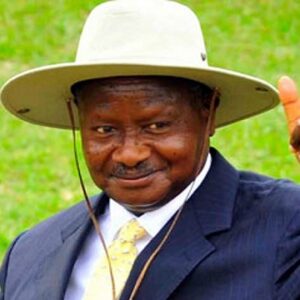Yoweri Museveni currently serves as the President of Uganda, a position he has held since 29 January 1986. Museveni served in the Ugandan intelligence service and led various political resistance groups prior to becoming president. Museveni fled to Tanzania with the deposed president, Dr. Apolo Milton Obote, during the period when Major General Idi Amin held power via a military coup. Museveni founded the Front for National Salvation and later the Popular Resistance Army during the Uganda-Tanzania War and Ugandan Bush War. Museveni’s presidency is widely regarded as having contributed to the country’s stabilization following decades of war and uprisings. Museveni’s presidency has been marked by the growth of the HIV/AIDS epidemic and rebellion, particularly in the country’s northern regions. Museveni, widely regarded as a member of a “new generation of African leaders,” has generally garnered widespread support from Western leaders. However, some of Museveni’s policy changes, such as the allowance of unlimited presidential terms, have cast doubt on his reputation as a democratic leader. Western countries responded to the implementation of these dubious democratic measures by withholding aid or exerting pressure on Uganda’s government leaders. Museveni has also come under fire for his apparent support for legislation that would criminalize homosexuality.
Childhood & Adolescence
Yoweri Kaguta Museveni was born in Ntungamo, Uganda, on 15 August 1944, into a Banyankole cattle herder family. He was raised alongside a brother named Calbe Akandwanaho and a sister named Violet Kajubiri.
Museveni was educated at Kyamate Elementary School, Mbarara High School, and Ntare School in Mbarara. During his senior year of high school, he became a born-again Christian.
Museveni moved to Tanzania in 1967 to study political science and economics at the University of Dar es Salaam, where he earned a bachelor’s degree in 1970.
Career of Yoweri
Museveni joined Uganda’s intelligence service in 1970, where he served President Dr. Apolo Milton Obote. Museveni fled Uganda for Tanzania in 1971, as did a large number of other members of the deposed government, including former President Obote, during the military coup led by Major General Idi Amin.
Museveni sided with exiled resistance forces in Tanzania during Amin’s rule. He also worked briefly as a lecturer in a co-operative college in Moshi, northern Tanzania, while residing there in exile. Museveni switched allegiances in 1973, abandoning the most mainstream opposition groups to Obote and founding the Front for National Salvation.
Museveni and his allies established the Popular Resistance Army in the rural southern regions of Uganda between 1981 and 1986, during the Ugandan Bush War. They collaborated to organize a rebellion against the Obote regime and the Obote-aligned Uganda National Liberation Army.
Museveni and his fellow resistance forces attacked an army installation in central Mubende on 6 February 1981. Obote’s government fell on 27 July 1985 as a result of a military coup led by Tito Okello. Museveni and the NRM/A party were enraged by the power grab, claiming that Okello and the UNLA had hijacked their own efforts.
On 20 January 1986, Idi Amin’s supporters entered Ugandan territory, aided by Zairean military troops, with the intention of deposing Okello. Within two days of the incursion, government troops were routed from Kampala. As a result, Museveni was able to defeat Okello’s government by leading his own faction to victory over the capital city.
Museveni was sworn in as Uganda’s new president on 29 January 1986. “This is not a simple change of guard,” he stated during his inaugural address. This is a sea change.”
Museveni enrolled Uganda in the IMF Economic Recovery Program in 1987 with the goal of generating economic growth, attracting investment, promoting trade, and establishing free and sustainable trade. Amnesty International published a report in 1989 detailing the grave human rights violations committed in Uganda by Museveni’s NRA troops.
Museveni was re-elected president in 1996 with 75.5 percent of the vote. International observers concluded that the elections were legitimately conducted. Museveni was re-elected in 2001, defeating rival Kizza Besigye with 69 percent of the vote. This time, Dr. Besigye petitioned the Ugandan Supreme Court, alleging that the elections were not conducted fairly, but his case was dismissed.
Museveni was re-elected in 2006 with 59 percent of the vote. Again, some concerns about voter malfeasance were raised; however, the vote was determined to be legitimate.
Significant Works of Yoweri
Uganda’s economy has stabilized to a large extent under Museveni’s leadership. He has been successful in resolving significant problems such as hyperinflation and balance of payments imbalances.
Awards and Accomplishments
Yoweri Museveni received an honorary Doctor of Laws degree from the Humphrey School of Public Affairs in 1994, the first of numerous honorary degrees he would receive from universities and the first of two from US institutions. Yoweri Museveni received five additional honorary doctorate degrees between 2003 and 2011.
These include a Doctor of Laws degree from Uganda’s Mbarara University of Science and Technology, a Doctor of Divinity degree from the United States’ Latin University of Theology, an honorary degree from Turkey’s Fatih University, a Doctor of Laws degree from Uganda’s Makerere University, and a Doctor of Literature degree from the University of Dar es Salaam.
Personal History and Legacies
Yoweri Museveni and Janet Kataha have been married since 1973 and have four children together: Muhoozia, Natasha, Patience, and Diana.
Estimated Net Worth
Yoweri Museveni’s net worth or net income is estimated to be between $1,000,000 and $5,000,000. He amassed such wealth through his primary career as a politician.
Trivia
According to Museveni’s biography on the State House of Uganda website, he enjoys cattle herding in Kisozi and Rwakitura.
While Museveni was initially lauded in Western countries, he has come under fire for his strident anti-gay stance. In 2014, Museveni signed an anti-homosexuality bill into law, making homosexuality illegal and punishable by life in prison.


